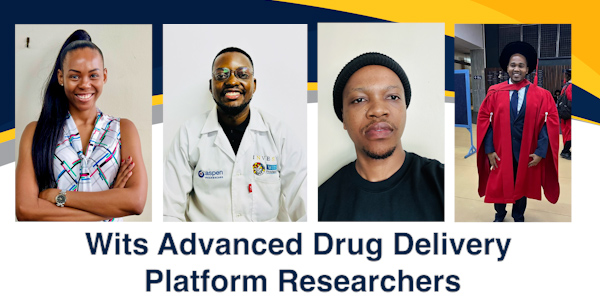World-class pharmaceutical sciences training goes global
- Wits University
Wits Advanced Drug Delivery Platform (WADDP) enables international research opportunities for its postgrads, postdocs, and early career researchers.

Dr Gillian Mahumane, Mr. Mashudu Mphaphuli, Mr. Lindokuhle Ngema, and Dr Khonzisizwe Somandi (pictured above left to right) are four of the WADDP researchers who have recently benefited from international research opportunities.
The WADPP research unit is Africa’s first, largest and only entity contributing to the design of novel targeted drug delivery systems, nanomedicine, functional biomaterials, and regenerative medicines.
As part of its internationalisation strategy, the WADDP seeks to build meaningful partnerships with multidisciplinary teams globally.
“We encourage WADDP students and researchers to undertake international stints as this provides a more globally cohesive approach to innovation in the pharmaceutical sciences,” says Professor Yahya Choonara, Director of the WADDP.
He adds, “The WADDP has an international reputation for research excellence in targeted areas of designing 21st Century patient-centric therapeutics. This has resulted in an increase in joint initiatives with key international partners.”
HIV prevention drug delivery at The Rockefeller University

A WADDP Early Career Researcher, Dr Gillian Mahumane was selected to participate in the Jeiven/CBR Fellowship Program for African Pharmaceutical Development Scientists.
The programme enables collaboration with CBR scientists on the design of multipurpose drug delivery product technologies for women.
Mahumane visited the Population Council’s Centre for Biomedical Research (CBR) at The Rockefeller University, New York City, USA, as part of an HIV Product Development Fellowship.
The three-month fellowship initiated a WADPP-CBR strategic partnership to develop novel HIV prevention drug delivery formulation technologies and Global South and Global North mentorship across the product development spectrum.
Using light to detect pharmaceutical materials in Switzerland

Mr. Mashudu Mphaphuli, a PhD candidate at the WADDP, was selected to attend the Next Generation Scientist programme at Novartis in Switzerland. His research project aimed to improve how pharmaceutical materials can be detected using light and confocal microscopy. Specifically, he wanted to see if certain materials that respond to temperature changes could be used to deliver drugs more effectively to targeted sites. Through this investigation, drug delivery efficiency and effectiveness will be enhanced.
The skills and knowledge that Mphaphuli acquired at Novartis, which he will bring back to the WADDP, will be invaluable for his doctoral studies. He plans to apply the cutting-edge techniques learned at Novartis to address critical healthcare challenges, contribute to the advancement of pharmaceutical research, and improve patient care in South Africa. He is currently working on a project to find new ways to treat a type of tuberculosis called bone-TB.
Research training in nanomedicine at Johns Hopkins

Mr. Lindokuhle Ngema, a PhD candidate in the WADDP, was selected for a prestigious Fulbright Foreign 足球竞彩app排名 Program scholarship. He spent nine months at Johns Hopkins University (JHU) in the School of Medicine.
Ngema’s research at the WADDP is at the frontiers of cancer nanomedicine. This led to his furthering his knowledge in the field at the Sidney Kimmel Comprehensive Cancer Centre (SKCCC) based at JHU.
Here he worked as a research trainee and acquired advanced skills in developing nanoparticle “drones” for drug delivery and immunoadjuvants to tumours. Accordingly, he will be using these skills to formulate “nanodrones” linked to his thesis at the WADDP on targeted therapy for lung cancer.
Ngema presented his work at the 65th American Association of Physicists in Medicine (AAPM) Annual Meeting and at the 65th American Society for Radiation Oncology (ASTRO) Annual Meeting.
From Singapore to Poland for 3D printing and wound-healing hydrogel

Dr Khonzisizwe Somandi, a postdoctoral candidate in Pharmaceutics at the WADDP, in January presented his research on a plant-derived wound healing therapy at the Global Young Scientist Summit in Singapore. He also visited the Singapore Centre for 3D Printing to observe advances and applications for 3D printing in science.
Next, Somandi will travel to Poland for research training in the Department of Organic and Physical Chemistry at the Medical University of Warsaw. Here he will learn new lab techniques in the field of synthesis and analysis of molecularly imprinted polymers. He will also undertake collaborative research related to advanced drug delivery and nanomedicine. The visit focuses on a joint project involving the design of a hydrogel as an antimicrobial system biofilm that targets and treats chronic wounds.
Choonara says, “These international stints provide an enriching experience for our WADDP students and scholars, and fosters diversity and integration across a range of countries and backgrounds. It also ensures that WADDP graduates have broader proficiencies to take on their role as global scientific citizens.”

